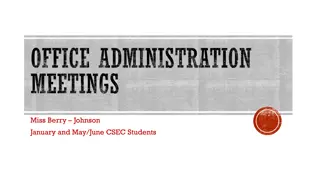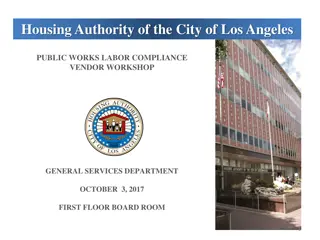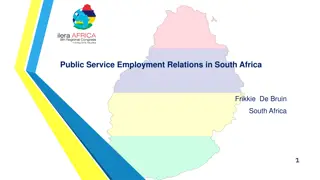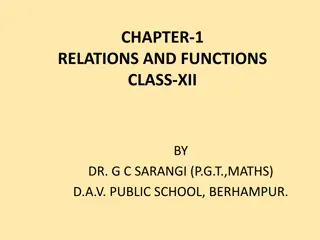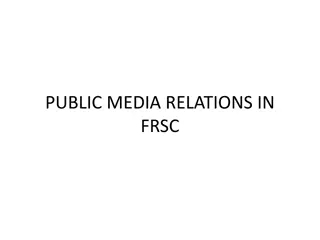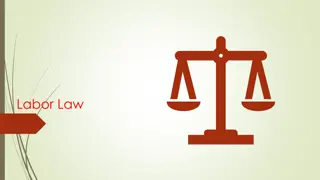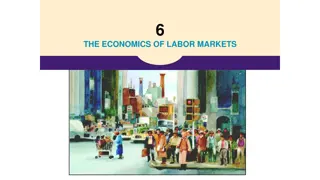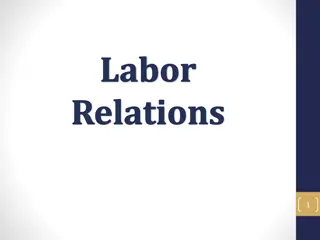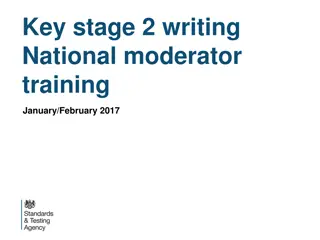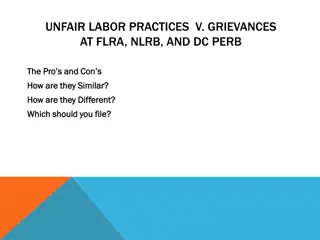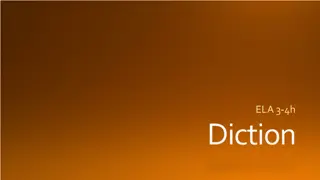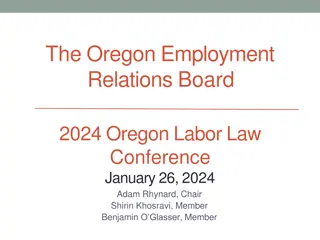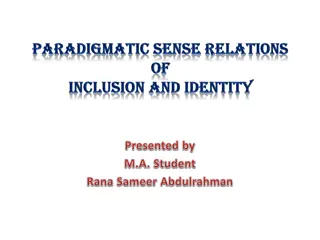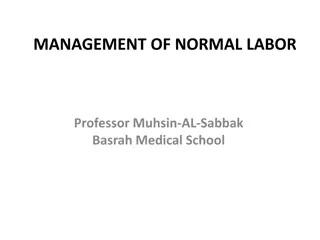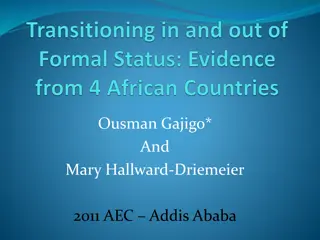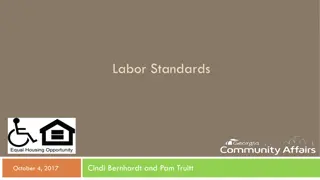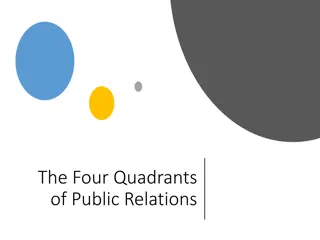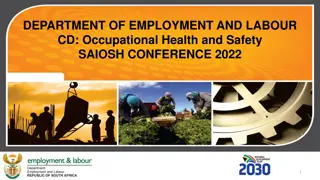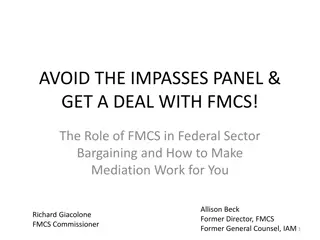Understanding Formality in Meetings under the Federal Service Labor-Management Relations Statute
The Federal Service Labor-Management Relations Statute provides guidelines for formal discussions and investigative examinations in the context of labor relations. It outlines the rights of unions to representation in formal meetings, emphasizing the importance of subject matter and formality. The distinction between formal and informal meetings is crucial, considering factors such as the level of management present, meeting duration, notification process, location, agenda, and note-taking practices.
Download Presentation

Please find below an Image/Link to download the presentation.
The content on the website is provided AS IS for your information and personal use only. It may not be sold, licensed, or shared on other websites without obtaining consent from the author. Download presentation by click this link. If you encounter any issues during the download, it is possible that the publisher has removed the file from their server.
E N D
Presentation Transcript
Meetings The Federal Service Labor-Management Relations Statute 1
5 U.S.C. 7114(a)(2)(A) & (B) provide the union the opportunity to be represented at: Formal Discussions Investigative Examinations (Weingarten interviews) 2
Formal Discussions Section 7114(a)(2)(A) provides: An exclusive representative of an appropriate unit in an agency shall be given the opportunity to be represented at: any formal discussion between one or more representatives of the agency and one or more employees in the unit or their representatives concerning any grievance or any personnel policy or practices or other general condition of employment 3
Two Key Elements SUBJECT MATTER + FORMALITY 4
Formality: Informal or Formal? Do the following factors tend to show a meeting is formal or informal? The Agency Director holds a meeting 5 out of 7 management officials attend a meeting Meeting lasts 5 minutes Employees were notified about a meeting 2 weeks in advance, via a written memo Meeting took place in the hallway by employees cubicles Agenda was passed out Agency secretary prepared minutes of the meeting Meeting was an open-ended dialogue between employees and management officials 5
Answers to Informal or Formal? The Agency Director holds a meeting: Formal 5 out of 7 management officials attend a meeting: Formal Meeting lasts 5 minutes: Informal Employees were notified about a meeting 2 weeks in advance, via a written memo: Formal Meeting took place in the hallway by employees cubicles: Informal Agenda was passed out: Formal Agency secretary prepared minutes of the meeting: Formal Meeting was an open-ended dialogue between employees and management officials: Informal 6
Formality Factors Totality of the Circumstances The level of supervisory or management officials conducting the meeting; Whether other supervisors or management officials attended; How long the meeting lasted; How the meeting was called; Where the meeting was held; Whether a formal agenda was established for the meeting; Whether attendance was mandatory; Were notes taken or a record made of the meeting; The subject matter addressed during the meeting; and The manner in which the meeting was conducted. F.E. Warren Air Force Base, Cheyenne, Wyo., 52 FLRA 149 (1996) ; Dep t of HHS, SSA, Bureau of Field Operations, S.F., Cal., 10 FLRA 115 (1982). 7
Formality Hypo At 9:00 a.m. on November 1, all claims processing employees receive an e-mail from their immediate supervisor. The e-mail states that a meeting will be held that afternoon at 2:00 p.m. A meeting agenda is attached to the e-mail. The meeting is held in one of the Agency s conference rooms. The employees immediate supervisor is the only management official present at the meeting. The supervisor does not take notes at the meeting, but she does send out an e-mail after the meeting briefly summarizing what was discussed. The meeting lasts 25 minutes. Is this meeting formal in nature? 8
Answer to Formality Hypo This meeting probably meets the formality elements. Factors that weigh AGAINST finding this was a formal meeting: Short notice (employees informed only few hours before) Immediate supervisor conducted the meeting Meeting lasted 25 minutes (30 or over tends to be formal) Factors that weigh FOR finding this was a formal meeting: Employees were notified by e-mail Agenda was attached to the e-mail Meeting was held in a conference room Supervisor e-mailed employees a meeting summary 9
SUBJECT MATTER Grievance; Personnel policy or practice; or General condition of employment 10
Subject Matter Hypos Is the subject matter requirement met in the following meetings? Step 2 grievance meeting Counseling session between an employee and his supervisor Meeting to inform two employees of a temporary reassignment in duties Meeting to discuss policies and procedures concerning annual leave Interview in preparation for an arbitration hearing or ULP hearing Meeting held to try to resolve an employee s EEO complaint, where EEO matters are specifically excluded from the bargaining agreement s grievance procedure 11
Answers to Subject Matter Hypos Step 2 grievance meeting: Meets subject matter requirement: U.S. DOJ, INS, N.Y. Office of Asylum, Rosedale, N.Y., 55 FLRA 1032 (1999). Counseling session between an employee and his supervisor: Does not meet subject matter requirement because it is individual situation, not personnel policy or practice or other general condition of employment: F. E. Warren Air Force Base, Cheyenne, Wyo., 52 FLRA 149 (1996). Meeting to inform two employees of a temporary reassignment in duties: Does not meet subject matter requirement because it s not a general condition of employment: Bureau of Field Operations, SSA, S.F., Cal., 20 FLRA 80 (1985). 12
Answers to Subject Matter Hypos cont. Meeting to discuss policies and procedures concerning annual leave: Meets subject matter requirement. U.S. DOD, Def, Logist. Ag., Def. Depot Tracy, Tracy, Cal., 37 FLRA 952 (1990). Interview in preparation for an arbitration hearing or ULP hearing: Meets subject matter requirement because this is considered a grievance; see section 7103(9) which states that a grievance includes any complaint by any employee relating to their employment, and includes any complaint made by a labor organization relating to the employment of any employee. Dep t of the Air Force, F. E. Warren Air Force Base, Cheyenne, Wyo., 31 FLRA 541 (1988). Meeting held to try to resolve an employee s EEO complaint, where EEO matters are specifically excluded from the bargaining agreement s grievance procedure: Meets subject matter requirement; see broad definition of grievance. Luke AFB, Ariz., 54 FLRA 716, 730-31 (1998). 13
Advance Notice A union is entitled to advance notice of a formal discussion so it can decide whether to attend and, if so, to designate a representative of its own choice to attend the meeting. Hypo: Manager Moe sends an e-mail to all of his employees about a meeting that will take place in 2 weeks. The meeting meets the formal discussion elements, but Moe forgets to notify the Union. The Union President is one of the employees Moe supervises, and he received the same e-mail that his co-workers received about the meeting. Has the Agency violated the Statute? 14
Answer to Advance Notice Hypo Hypo: Manager Moe sends an e-mail to all of his employees about a meeting that will take place in 2 weeks. The meeting meets the formal discussion elements, but Moe forgets to notify the Union. The Union President is one of the employees Moe supervises, and he received the same e-mail that his co-workers received. The Agency has not violated the Statute. The Agency should have notified the Union about the meeting separately, but this hypo illustrates an exception to the advance notice requirement, where the Union has actual notice of the meeting and had the opportunity to send an appropriate representative. Dep t of the Air Force, Sacramento Air Logistics Ctr., McClellan Air Force Base, Cal., 29 FLRA 594 (1987); see also GSA, Reg. 9, L.A., Cal., 56 FLRA 683 (2000). 15
Investigatory Examinations (Weingarten) Section 7114(a)(2)(B) of the Statute entitles the union to be given the opportunity to be represented at: an examination of an employee in connection with an investigation; If the employee reasonably believes that disciplinary action may result against the employee; AND If the employee requests representation. Fed. Bureau of Prisons, OIA, Wash., D.C. & Fed. Bureau of Prisons, OIA, Aurora, Colo. & Fed. Bureau of Prisons, OIA, Littleton, Colo., 54 FLRA 1502 (1998); NLRB v. Weingarten, Inc., 420 U.S. 251 (1975). 16
Examination Where management s meeting with the employee is designed to ask questions, elicit additional information, have the employee admit his alleged wrongdoing, or explain his conduct. Dep t of the Treasury, Internal Revenue Service, 15 FLRA 360, 361, 370 (1984). 17
Examination Hypo 1 Supervisor Steve calls an employee into his office to tell him he has not been following the correct procedures for requesting leave, and warns him that failing to follow the procedures in the future could result in disciplinary action. Steve does not ask the employee any questions. Is this an examination? 18
Answer to Exam Hypo 1 Supervisor Steve calls an employee into his office to tell him he has not been following the correct procedures for requesting leave, and warns him that failing to follow the procedures in the future could result in disciplinary action. Steve does not ask the employee any questions. This is not an examination because it is not designed to elicit information. It appears to only be a counseling session. Dep t of Treasury, IRS, 15 FLRA 360 (1984). 19
Examination Hypo 2 An FAA employee is called into a manager s office for what the manager calls a counseling session. The employee is questioned about her use of abusive language in the control tower. Is this an examination? 20
Answer to Exam Hypo 2 An FAA employee is called into a manager s office for what the manager calls a counseling session. The employee is questioned about her use of abusive language in the control tower. This is an examination, illustrating that it does not matter what the meeting is called. Fed. Aviation Admin., St. Louis Tower, Bridgeton, Mo., 6 FLRA 678 (1981). 21
Examination Hypo 3 A nurse is called into her supervisor s office and is asked to write out a statement explaining how the wrong medication was given to a patient. Is this an examination? 22
Answer to Exam Hypo 3 A nurse is called into her supervisor s office and is asked to write out a statement explaining how the wrong medication was given to a patient. This is an examination; an examination does not have to be verbal. It can be written. U.S. INS, U.S. Border Patrol, Del Rio, Tex., 46 FLRA 363 (1992). 23
Examination Hypo 4 Manager Mary calls an employee into her office to go over the employee s yearly performance evaluation. Is this an examination? 24
Answer to Exam Hypo 4 Manager Mary calls an employee into her office to go over the employee s yearly performance evaluation. This is not an examination because it is held for the purpose of giving the employee feedback, not investigating wrongdoing or misconduct. IRS, Detroit, Mich., 5 FLRA 421(1981). 25
Examination Hypo 5 Supervisor Sam calls an employee into his office for the sole purpose of giving the employee a letter of reprimand for failing to follow the correct case processing procedures. Is this an examination? 26
Answer to Exam Hypo 5 Supervisor Sam calls an employee into his office for the sole purpose of giving the employee a letter of reprimand for failing to follow the correct case processing procedures. This is not an examination because the employee is simply being informed of a decision the supervisor has already made. U.S. Air Force, 2750 Air Base Wing Hdqtrs., Air Force Logistics Command, Wright-Patterson Air Force Base, Ohio, 9 FLRA 871 (1982). 27
Examination Hypo 6 Manager Milton calls an employee into his office to question him about a cash register shortage. Milton believes a different employee is responsible, and is trying to get information from other employees to confirm his belief. Does the employee have a right to request union representation? 28
Answer to Exam Hypo 6 Manager Milton calls an employee into his office to question him about a cash register shortage. Milton believes a different employee is responsible, and is trying to get information from other employees to confirm his belief. If Milton has a reasonable belief he might be disciplined, he has the right to ask for representation. It doesn t matter that he s not the subject matter of the investigation. IRS, Wash., D.C. & IRS, Hartford, Dist. Office, 4 FLRA 237 (1980), enforced, IRS v. FLRA, 671 F.2d 560 (D.C. Cir. 1982). 29
Request for Representation The totality of the circumstances must be sufficient to put the agency on notice of the employee s desire for representation. U.S. DOJ, Fed. Bureau of Prisons, OIA, Wash., D.C., 55 FLRA 388 (1999). 30
Once the elements of a Weingarten meeting are met, an agency must: Grant the request for representation Discontinue the interview; or Offer the employee the choice between continuing the interview unaccompanied by a union representative or having no interview at all. Norfolk Naval Shipyard, Portsmouth, Va., 35 FLRA 1069 (1990). 31
Limitations on the Unions Right to Designate a Representative: Agency may reject a particular representative where it can demonstrate special circumstances, such as to preserve the integrity of the investigation. Fed. Bureau of Prisons, OIA, Wash., D.C. & Fed. Bureau of Prisons, OIA, Aurora, Colo. & Fed. Bureau of Prisons, OIA, Littleton, Colo., 54 FLRA 1502 (1998). Agency need not postpone examination to allow an employee to be represented by a particular union official if another is available. INS, N.Y. Dist. Office, 46 FLRA 1210 (1993). 32
Unions Role During an Examination Hypo: Manager Margaret is conducting an investigatory examination with an employee. The employee requested union representation, and Margaret granted the request. During the examination, the union representative attempts to ask a clarifying question, but Margaret cuts him off, stating: This is my meeting. I will ask the questions, and you will be quiet. Has the Agency violated the Statute? 33
Answer to Unions Role Hypo Hypo: Manager Margaret is conducting an investigatory examination with an employee. The employee requested union representation, and Margaret granted the request. During the examination, the union representative attempts to ask a clarifying question, but Margaret cuts him off, stating: This is my meeting. I will ask the questions, and you will be quiet. This is a violation of the Statute. The Union is allowed to play an active role in the meeting. However, the Union is not allowed to direct the employee not to answer questions, or to disrupt the meeting to the point where the manager cannot conduct the investigation. 34


